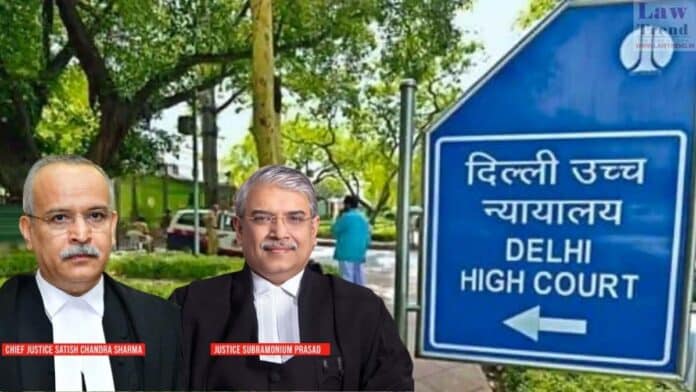The Delhi High Court Friday asked the consortium of National Law Universities when entrance examinations for medical and engineering courses can be held in regional languages, why not the Common Law Admission Test (CLAT) which is conducted in English.
The high court granted four weeks to the consortium to file its response to a petition seeking conduct of CLAT-2024 not only in English but also regional languages.
A bench of Chief Justice Satish Chandra Sharma and Justice Subramonium Prasad said there are experts who translate papers of NEET in regional languages, then “why can’t we have these papers (CLAT) translated in regional languages?”

“If medical education can be taught in Hindi, if the entrance examination for MBBS can be held in Hindi, JEE can be held in Hindi, what is this you are talking about,” the bench said, adding even AIBE (All India Bar Examination) is also held in Hindi.
The counsel for the consortium said the body was not taking the plea as adversarial, and it was in agreement that the examination should also be held in other languages.
“The idea is definitely to make it more inclusive. The only concern is that we have to have necessary linguistic experts with legal knowledge,” he said.
The Public Interest Litigation, filed by Sudhanshu Pathak, who is a law student at Delhi University, contended that CLAT (UG) examination “discriminates” and fails to provide a “level playing field” to the students whose educational backgrounds are rooted in regional languages.
Senior advocate Jayant Mehta, representing the petitioner, said a reply by the consortium at an early date is necessary otherwise the matter will become infructuous as the examination is scheduled by the end of this year.
He said in case the matter is not heard at an early date, the consortium will say now it doesn’t have time to translate the English paper into other regional languages.
Agreeing with the submission of the senior counsel, the bench said, “The concern of senior advocate Jayant Mehta is a genuine concern and therefore, respondent number 1 (Consortium of National Law Universities) is granted four weeks time to file reply positively”.
The bench listed the matter for further hearing on July 7.
The petitioner, also represented through lawyers Akash Vajpai and Sakshi Raghav, said: “In a hyper-competitive paper, they (students from non-English language background) are linguistically disempowered as they have to surpass the additional hurdle of learning and mastering a new language.
“Naturally, aspirants belonging to English-medium schools have an advantage over their peers belonging to schools operating in Hindi or other vernacular languages. The underprivileged and disempowered aspirants can never view an exam solely based in English as obvious’ unlike their privileged, English-speaking competitors.”
Central government standing counsel Bhagwan Swarup Shukla stated the NEET examination, which is held for admission in MBBS courses, and JEE examination, which is conducted for engineering colleges and IITs, are also held in most of the regional languages.
He sought time to seek instructions in the matter and the court granted him four weeks.
The consortium’s counsel said it is a society and new members have been inducted. He said there is a committee for the purpose of language in respect of CLAT examination which will also take a call on holding the exam in other Indian regional languages as per Schedule 8 of the Constitution.
He said a meeting of the committee is scheduled for Saturday when the issue will be discussed.
The counsel for the Bar Council of India (BCI) submitted it does not conduct CLAT, but AIBE, the exam it holds for enrolment of advocates, is conducted in most of the regional languages.
The high court had earlier issued notices and sought responses of the Consortium of National Law Universities, BCI and the Centre through the Ministry of Education on the petition.
The plea said the New Education Policy, 2020 and Right of Children to Free and Compulsory Education Act, 2009 require mother tongue to be the medium of instruction in schools and higher education institutions.
It said it is unfortunate that English, as the only medium of CLAT-(UG), is depriving a huge portion of the students, who have studied in their regional or native languages, of the opportunity to opt for a 5-year LLB course.
CLAT-2024 is scheduled to take place in December 2023.
“Through this petition, the petitioner is seeking issuance of an appropriate writ or direction to respondent no.1 to conduct CLAT-2024 not only in English language but all other regional languages of the Eight schedule of the Constitution of India as practice of taking CLAT (UG) only in English has an element of arbitrariness and discrimination and hence violative of article 14 and 29(2) of the Constitution,” it said.
Also Read
The plea referred to a recent survey conducted by IDIA Trust (Increasing Diversity by Increasing Access to legal education), indicating that over 95 per cent of all surveyed students came from schools where the medium of instruction was English both at the secondary and higher secondary level.
“This figure has been more or less consistent with the results of the 2013-14 survey wherein 96.77 per cent of the surveyed students came from English medium backgrounds, indicating that proficiency in the English language continues to be a major factor for gaining admission to a top NLU in the country,” it said.







